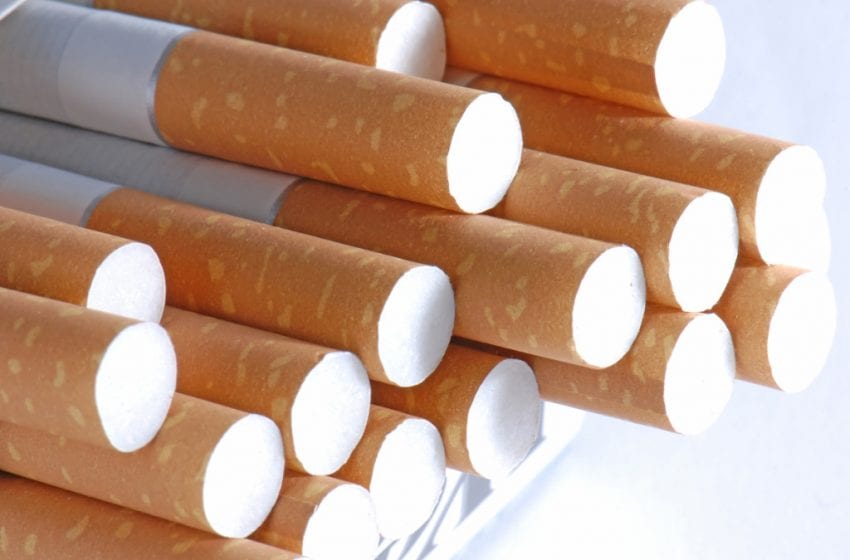British American Tobacco says that an EU proposal to ban certain single-use plastics amounts to a laudable goal but one that is not entirely workable in its present form, according to a story by Martin Banks for The Parliament Magazine.
Banks reported that a parliamentary committee last week adopted a report by Belgian MEP Frederique Ries that aims to curb litter comprising the single-use plastics most commonly found on Europe’s beaches.
Under the draft rules backed by the environment committee, single-use plastic items such as plates, cutlery and cotton buds, which make up more than 70 percent of marine litter, would be banned.
Giovanni Carucci, vice president of EU Affairs with BAT, was said to have told the Magazine that reducing the environmental impact of single use plastics was a laudable goal.
“We are committed to reducing our environmental impact across our supply chain,” he said. “While we need time to analyse the full impact of the proposal, what I can say is that in its current form, it is not entirely workable.
“As the Commission acknowledges in its own impact assessment, today an alternative for cigarette filters that is as effective as cellulose acetate does not exist.
“We’ve researched alternatives for years, including collaborating with sustainable filter start-ups and other external companies, however none of the alternatives match the performance of cellulose acetate and will likely be in breach of the requirements of the Tobacco Products Directive (TPD).
“This makes the Parliament’s proposed consumption reduction targets a de facto ban on cigarettes, which is not in the scope of the Single Use Plastics Directive.”
Carucci said also that labeling aspects of the proposal would conflict with existing tobacco-labeling requirements, and that the proposals could involve the tobacco industry and member states in disproportionate costs and complexity.
Meanwhile, a commission spokesman was quoted as saying that more than 80 percent of marine litter comprised plastics. “Plastic residue is found in marine species – such as sea turtles, seals, whales and birds, but also in fish and shellfish, and therefore in the human food chain,” he said.
“While plastics are a convenient, adaptable, useful and economically valuable material, they need to be better used, re-used and recycled.”
Banks said that the Ries’ report would be put to a vote by the ‘full plenary’ in its 22-25 October session in Strasbourg.
Category: Regulation

Filters proposal unworkable

Quit program lacking
More than 20,000 people signed up for a 28-day, quit-tobacco-smoking program run by Singapore’s Health Promotion Board (HPB) last year, but only about 10 percent stayed away from cigarettes for the duration of the program, according to a story in The Straits Times.
“It’s not as high as we’d like, but internationally it compares quite well,” said Senior Parliamentary Secretary for Health and Home Affairs Amrin Amin.
He was giving updates on the HPB’s I Quit 28-Day Countdown program, which was said to have given smokers the knowledge and motivation to give up their habit, while at the same time launching a new campaign to raise awareness about smoking’s downsides.
Earlier this year, the government announced it aimed to reduce the number of smokers to under 10 percent of the population by 2020. Last year the smoking rate was 12 percent.
Getting people to give up smoking was not a one-off effort, and various factors played a part in getting people to quit, said Amrin. The government would study ways to strengthen the process over the next year or so.
According to a study conducted by the HPB last year, the top three factors that would motivate smokers to quit were health, family and finances.
Singapore is one of a number of countries that have banned the sale of all vaping products.
Tobacco ban threat
Hong Kong’s Chief Executive Carrie Lam Cheng Yuet-ngor said on Thursday it was worth considering banning traditional tobacco products, according to a story at ejinsight.com citing reports by Apple Daily and the Hong Kong Economic Journal.
Lam’s statement on a possible tobacco-products ban came the day after she announced the Government’s intention to impose a ban on electronic cigarettes. She had been asked during a radio interview why, if it were concerned about public health, the Government wanted to ban e-cigarettes but not traditional tobacco.
Her latest remarks were an apparent about-face. Lam said on Wednesday it was not proper to ban abruptly a long-existing commercial activity, referring to the sale of traditional tobacco products.
The chief executive said that she was bold enough to impose a total ban on traditional tobacco, but that there were a lot of pros and cons that needed to be considered before doing so.
She said also that the prevalence of smoking among people aged 15 and older had dropped to 10 percent from 20 percent in the 1980s, indicating that Government efforts to reduce smoking had been successful.
Meanwhile, the Secretary for Food and Health Professor Sophia Chan Siu-chee said the policy of banning the importation, manufacture, sale, distribution and advertisement of e-cigarettes had been finalized and would not be changed.
There are concerns that e-cigarette smokers will be forced to return to traditional cigarettes once the ban takes effect, but Chan said that was mere speculation and not supported by data.
A study conducted last month by the Foundation for a Smoke-Free World showed more than six in 10 adult smokers said they relied on e-cigarettes to help them quit smoking.
Chan said authorities would step up efforts at tobacco control after implementation of the e-cigarette ban.
E-cig epidemic crackdown
The US Food and Drug Administration says it has sent letters to electronic-cigarette companies seeking to discover if 40 such products are being marketed illegally.
In a note issued through its Center for Tobacco Products, the FDA said the 21 letters that had been sent included those to the manufacturers and importers of the brands Vuse Alto, myblu, Myle, Rubi and STIG.
It said it was ‘seeking information about whether more than 40 products – including some flavored e-cigarette products – are being illegally marketed and outside the agency’s current compliance policy’.
‘These new actions build on those taken by the FDA in recent weeks as part of its Youth Tobacco Prevention Plan to address the epidemic of youth e-cigarette use, including cracking down on the sale and marketing of e-cigarettes to kids and educating youth about the dangers of using these products,’ the note said.
“Companies are on notice – the FDA will not allow the proliferation of e-cigarettes or other tobacco products potentially being marketed illegally and outside of the agency’s compliance policy, and we will take swift action when companies are skirting the law,” FDA Commissioner Scott Gottlieb, M.D, was quoted as saying. “Given the explosive growth of e-cigarette use by kids, we’re committed to taking whatever measures are appropriate to stem these troubling use trends. We’re going to address issues related to the access kids have to e-cigarettes, as well as the youth appeal of these products. If products are being unlawfully marketed and outside the FDA’s compliance policy, we’ll act to remove them.”
‘The FDA has received complaints that some companies may be marketing new products that do not meet the Food Drug and Cosmetic Act’s (FD&C Act) premarket requirements and that were introduced or modified after the deeming rule’s Aug. 8, 2016, effective date,’ the note said. ‘Such modifications could include the introduction of new product features, formulations or flavors. These letters ask companies to provide information about the products in question, including evidence that the product is a deemed product that was on the market as of Aug. 8, 2016 and has not been modified since that date.
‘Any product that does not comply with the premarket requirements of the FD&C Act is adulterated and misbranded and may not be marketed without authorization from the FDA. The agency has several tools to enforce these requirements and its regulations, including pursuing administrative actions such as civil money penalty complaints (fines) or judicial actions such as seizures or injunctions.’
There is more information here.
Fontem products compliant
All the vaping products sold by Fontem Ventures in the US were available prior to the effective date of the Food and Drug Administration’s deeming rule, August 8, 2016, according to a note posted on the Imperial Brands website.
‘On 12 October 2018 the US Food and Drug Administration (FDA) stated that it had requested information from 21 manufacturers, including our Fontem Ventures subsidiary in the US, to support their compliance with certain FDA rules on the marketing, sale and distribution of vaping products in the US,’ the note said.
‘All Fontem Ventures products in the US were available prior to 8 August 2016. We will be providing the required supporting information to the FDA in line with its 30-day deadline.
‘We fully recognise the challenge faced by the FDA in balancing the positive public health potential of vapor products with legitimate concerns regarding youth access and responsible marketing.
‘Imperial Brands and Fontem are committed to creating something better for the world’s smokers. Vaping provides a unique opportunity to switch smokers to a healthier alternative but this can only be achieved by responsible businesses operating in appropriately regulated markets.
‘We will continue to engage with the FDA and other regulators around the world to shape the regulation that will encourage smokers to switch, focusing on issues including youth access prevention, product standards, harm reduction and responsible marketing.
Diplomatic smoke signals
Hungary’s Minister of Foreign Affairs and Trade Peter Szijjarto has imposed a tobacco-smoking ban on the ministry’s properties and on those of Hungarian embassies around the world, according to a Xinhua News Agency story citing an ‘official’ speaking in Budapest on Saturday.
‘Smoking is henceforth prohibited in all of the locals of the Ministry of Foreign Affairs and Trade,’ the Hungarian official journal reportedly announced. ‘The ban concerns all of the real estates falling under the management of the ministry, may it be owned or rented, in Hungary or abroad, such as embassies.’
The new measure bans also the designated, enclosed smoking areas, that have been in use up to now. Smokers will be allowed to smoke only outside, on the streets.
The directive does not stipulate how often employees can break from their work to smoke a cigarette.
Public looking for facts
A new global survey has indicated that 77 percent of adults agree that governments should do all they can to encourage people who would otherwise keep smoking cigarettes to switch completely to ‘better alternatives’.
The survey was commissioned by Philip Morris International and conducted by Ipsos.
In a note posted on its website, PMI said that smoking was ranked alongside obesity, alcoholism and opioid use in its importance as a public health issue. Importantly, the multinational survey showed strong support for the role that innovation and technology should play in resolving these global health problems.
“This survey shows that most people around the world agree that smoking is still a serious public health problem,” Dr. Moira Gilchrist, vice president of scientific and public communications at PMI, was quoted as saying. “They want to see action to tap into the opportunity provided by alternatives to cigarettes that are scientifically substantiated. We are in complete agreement with that view. Public opinion aligns with common sense, and the survey confirms what we have heard for more than a decade.”
PMI said the survey results had shown also that 86 percent of respondents believed consumer goods companies had an obligation continually to research and innovate their products in the interest of public health. ‘However, only 35 percent thought that governments have done a good job to ensure everyone has access to the latest innovations and advancements,’ the PMI note said. ‘Clearly, society does not want governments to block promising solutions to public health problems.’
Publication of the study results follows a meeting of the Conference of the Parties (COP) to the World Health Organization’s Framework Convention on Tobacco Control (FCTC) in Geneva last week, where 181 member countries and non-governmental organizations (NGOs) met to decide on global tobacco control policy recommendations. None of their discussions were open to the public or media.
‘Although many individual states took progressive positions, the disappointing and unfortunate outcome of the COP will mean that millions of smokers will not know about better alternatives to cigarettes,’ PMI said. ‘This approach is in sharp contrast with public opinion: 92 percent of those surveyed agreed that smokers should have access to accurate information to guide their choices.’
Gilchrist said the science was clear. “The evidence shows that switching to a smoke-free product is a better choice than continuing to smoke,” she said. “We simply cannot keep smokers in the dark about this information. The COP missed an opportunity to put people and science at the heart of its policymaking.”
‘Contrary to common sense, the tobacco industry has been discouraged from innovating and inadvertently encouraged to keep cigarettes at the core of their business models,’ PMI said.
‘Despite this, at PMI we will not waiver from our commitment to provide the world’s 1.1 billion smokers with better alternatives to cigarettes, as well as information about these options.
‘Countries now have the opportunity to implement local regulations that embrace science and technology. Progressive polices can effectively protect overall population health, while still working in the best interests of men and women who smoke.’
“With any other global problem, from the environment to obesity, everyone works together to deliver better alternatives, inform people about them and incentivize them to change behavior,” Gilchrist said. “Why should this common-sense approach not apply to tobacco?”
‘The clear call from society for more information about, and access to, better alternatives to cigarettes did not come without important caveats that we support,’ PMI said. ‘Of those surveyed, 92 percent agreed that these new products must have robust scientific testing prior to being introduced into the market, and 91 percent agreed that once these products have been introduced their impact needs to be monitored to ensure they are reducing the harm caused by cigarettes.
The survey data can be view here.
Credit ratings up in smoke
Health authorities in Beijing will include illegal tobacco smoking into citizens’ credit records as part of the city’s smoke-free Beijing campaign, according to a China.org.cn story quoting the Beijing Youth Daily.
In addition to publicly naming and shaming offenders, the Beijing Municipal Commission of Health and Family Planning will share information about their offending with the city’s industry and commerce authorities.
Citizens in Beijing with a bad credit record could face difficulties in applying for commercial loans.
Beijing imposed a blanket smoking ban on June 1, 2015, covering all indoor public places, workplaces and public transportation. The ban is said to be the strictest of its kind in China.
According to a report by the Beijing Tobacco Control Association, 2,265 violations of the ban were reported to the public WeChat account of Smoke-free Beijing between August and September this year.
Meanwhile, the association reported also an increasing number of complaints over the use of electronic cigarettes in public places.
In response, the Beijing Municipal Commission of Health and Family Planning said that more studies would be carried out into the harm caused by vaping electronic cigarettes to provide a scientific basis for its control.
Retail licenses suspended
Six Singaporean tobacco retailers that sold cigarettes to people under the age of 18 have had their licenses for selling tobacco products suspended for six months, according to a story in The Straits Times quoting a statement by the Health Sciences Authority (HSA).
The HSA said the six had not asked for identification to check the buyers’ ages.
It said the staff involved had said they were too busy to ask for identification or that the minors had looked older than their ages.
Sellers, the HSA said, took the risk of contravening the law if they assessed age by physical appearance alone.
It said that tobacco retailers were responsible for all sales of tobacco products taking place at their outlets.
Retailers will have a job on their hands training staff for the future. The minimum legal age to use, possess or buy tobacco products will be raised to 19 next year. And it will be increased to 20 in 2020, and 21 from 2021.
Under current laws, anyone convicted of selling tobacco products to a person under 18 can be fined up to S$5,000 for a first offence. Repeat offenders face a fine of up to S$10,000.
In addition, a seller’s tobacco retail license is liable to be suspended for six months for a first offence and revoked for a second offence.
However, if buyers are minors dressed in school uniform or below 12 years old, the outlet’s retail license is liable to be revoked for a first offence.
Since 2015, the HSA has suspended 79 retail licenses and revoked 11 others.
Swedish Match tries again
The US Food and Drug Administration said yesterday it had posted an amendment to the modified risk tobacco product applications (MRTPAs) for General Snus products submitted by Swedish Match North America.
The FDA said that, on December 14, 2016, it had denied the company’s request ‘to remove a currently required warning statement that products can cause gum disease and tooth loss’.
‘With respect to the company’s other requests to remove or revise two additional currently required warnings, FDA deferred final action and issued a response that offered the company an option to amend its applications,’ it said in a note issued through the Center for Tobacco Products.
‘FDA will post any future amendments to the application on the Center for Tobacco Products’ website on a rolling basis as the materials are redacted.’
More information is available here.










